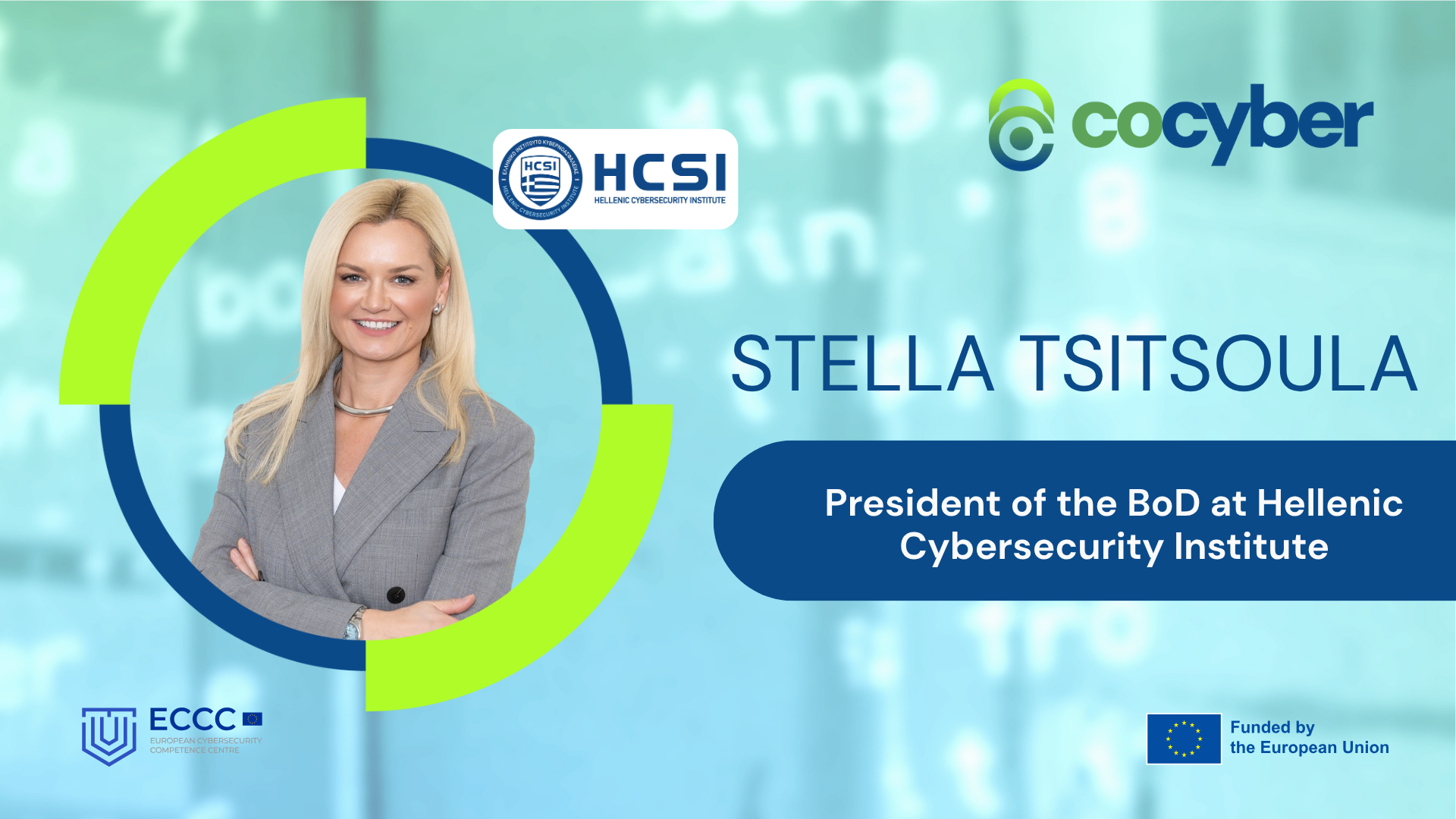COcyber Batch #1 Ambassadors in the Spotlight: Stella Tsitsoula

Six months ago, the COcyber project launched the first round of its Ambassador Programme, an initiative designed to strengthen communication and engagement across Europe’s cybersecurity ecosystem. The programme brought external voices into the project’s outreach efforts, inviting experienced professionals to contribute through public dialogue, community engagement, and strategic insights.

As the first ambassador cohort concludes its mission, we’re taking time to reflect on each of their contributions, perspectives, and what they see as key priorities going forward.
In this article, we spoke with Stella Tsitsoula to hear about her experience, her views on European cybersecurity, and her message as this six-month journey comes to an end.
Who are you, and what is your professional background?
I am a communications consultant specialising in technology and cybersecurity. For more than 25 years, I’ve held senior roles in media and communications, supporting organisations in developing cybersecurity strategies, awareness campaigns, and crisis communication plans. My background combines journalism and technical knowledge, with degrees in Computer Systems Engineering and Public Relations Management, and a Master in Business Administration.

Today, I serve as Chairwoman of the Hellenic Cybersecurity Institute, a non-profit organisation we founded in 2023 to promote education, awareness, and policy dialogue around digital information security. I also co-founded the Greek chapter of Women4Cyber and I am a member of the Cyber Security Forum Initiative (CSFI).
Since when and how are you involved in the European cybersecurity sector?
I have been active in European cybersecurity since 2017, when I became the communication manager for Greece’s National Cyber Security Team. In that role, I’ve supported national participation in ENISA’s Pan-European Cybersecurity Challenge, helping raise awareness and visibility for youth engagement in cybersecurity.
Since then, I have launched and contributed to several initiatives that promote inclusive cybersecurity dialogue and capacity-building—especially through the Women4Cyber network and the Hellenic Cybersecurity Institute, which supports community-driven innovation and strategic outreach in Greece and beyond.
From your perspective, what are the main challenges in the collaboration of the civilian and defence cybersecurity sector in Europe?
Civilian and defence cybersecurity sectors face fundamental differences in how they operate, communicate, and prioritise goals. Defence actors focus on long-term strategy, classified systems, and national security, while the civilian sector emphasises data protection, infrastructure resilience, and transparency. These different cultures and mandates create barriers to trust and collaboration.
Legal frameworks like the NIS2 Directive often conflict with military confidentiality protocols, making coordination difficult. Threat intelligence sharing is still limited, and cultural gaps—combined with geopolitical pressures - widen the divide. Overcoming these obstacles requires mutual understanding, aligned interests, and standardised ways of working together.
Again, from your perspective, what are the most crucial steps to address these challenges and strengthen Europe’s joint digital safety efforts?
To bridge these divides, we need to create common standards and secure platforms that allow for structured cooperation. Cross-sector training programmes and shared simulations can build trust and understanding between defence and civilian actors. Legal frameworks must evolve to support controlled information exchange in sensitive contexts.
Public-private partnerships should be strengthened through targeted incentives, and we must build public trust through clear communication about dual-use technologies and cybersecurity responsibilities. Investing in awareness, transparency, and inclusive dialogue will help ensure that Europe’s digital safety efforts are truly collaborative and effective.
Did your experience as a COcyber Ambassador align with what you expected at the beginning and what are your key reflections now that the journey is ending?
Yes, my experience as a COcyber Ambassador aligned well with what I expected at the beginning — and in some ways, it pleasantly surprised me. From the outset, I appreciated how clear and well-structured the role was. The tasks were specific and realistic, which made it easy to contribute meaningfully despite a busy schedule. The team’s communication and support also played a big part in making this a smooth and enjoyable experience.

One key takeaway for me is the value of bringing together professionals from both the civilian and defence cybersecurity sectors. COcyber created real opportunities for dialogue, knowledge exchange, and new connections — something that I found both refreshing and inspiring.
Lastly, I truly appreciated the chance to be part of a European initiative like COcyber. It allowed me to meet interesting people from across the cybersecurity landscape, share ideas, and contribute — even in a small way — to promoting the project’s goals. It was a meaningful and enriching experience that gave me a broader perspective on cybersecurity collaboration in Europe.

